SOC 105 Individual, Group and Society: An Introduction to Sociology (3 Credits)
M&W, 11:00-12:15pm, Erela Portuglay, PhD
M&W, 2:00-3:15pm, Prof. Gwendolyn Dordick
M&W, 5:00-6:15pm, Jennifer Sloan
T&Th, 9:30-10:45am, Prof. James Biles
T&Th, 5:00-6:15pm, Talha Issevenler, PhD
Fri., 9:00-11:30am, Ed Silver, PhD
Fri., 12:00-2:30pm, Colin Ashley
All Sections are In-Person
ZERO TEXTBOOK COST
The language of sociology, the sociological perspective, and basic areas of sociological inquiry. Topics include: culture, socialization, self and society, social stratification and social class, the family, religion, policy, community organization, collective behavior, mass culture, social order and social change.
This course fulfills a general education requirement and is required for Sociology majors and minors.
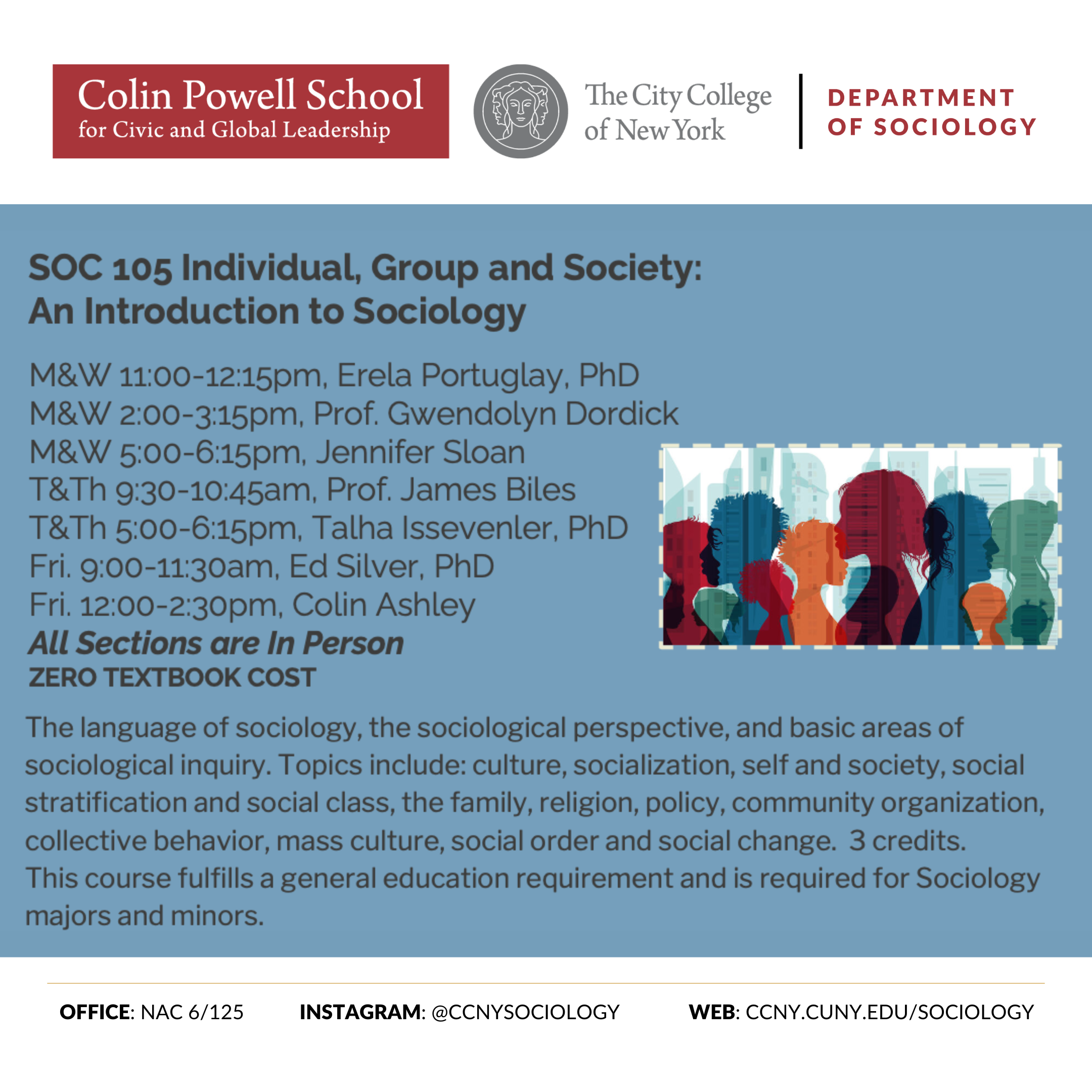
SOC 231 Sociological Statistics (3 Credits)
M&W 9:30-10:45am
In-Person
Instructor: Shu-Hao Chang
An introduction to statistical theory and techniques as utilized by sociologists. This course covers descriptive and inferential statistics.
No prerequisite - please contact Prof. Gwen Dordick, Ms. Bowman, or CPS advisor, if needed.
Credit given for only one of the following courses: SSC 31100, SOC 23100, ECO 20150, PSY 21500.
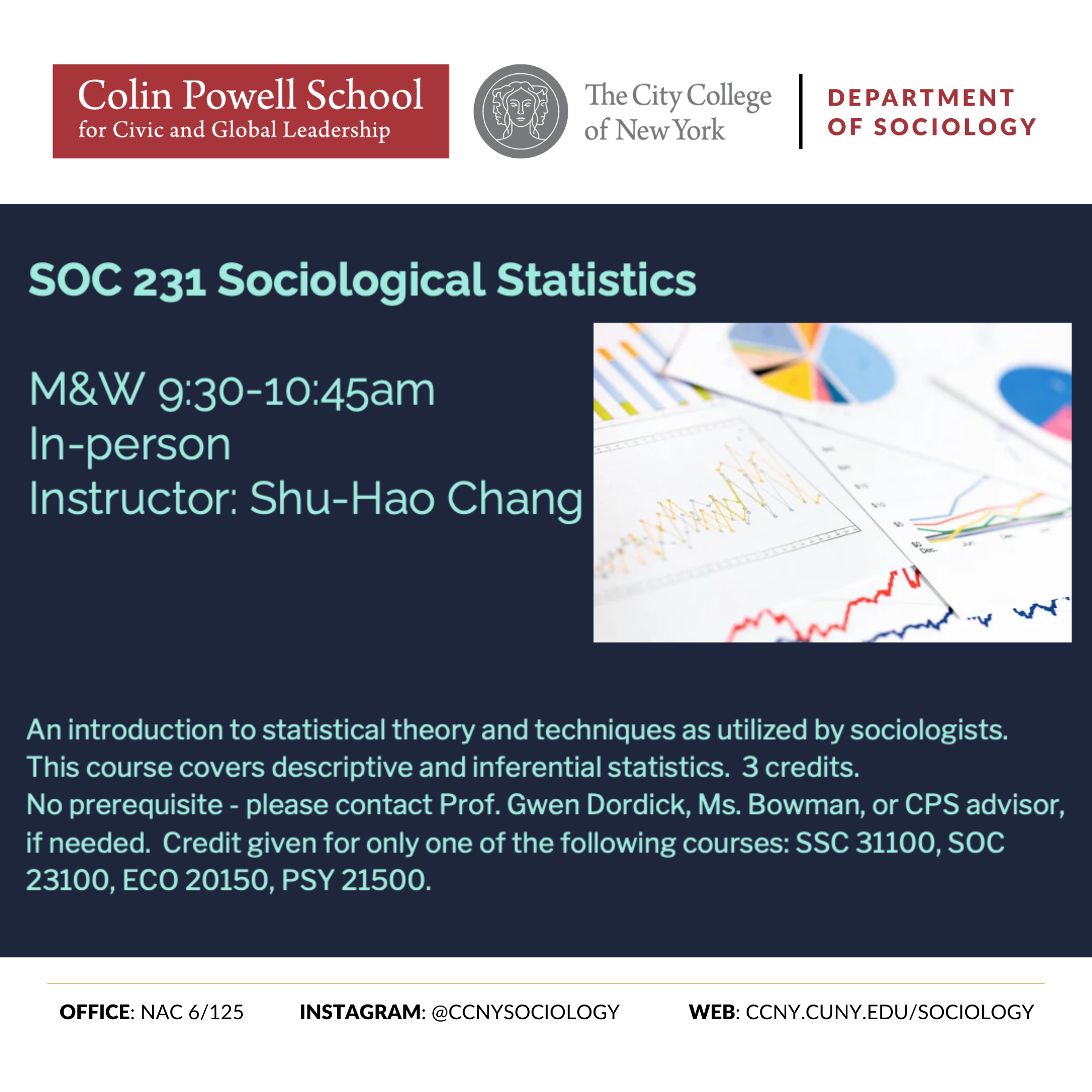
SOC 232 Methods and Techniques of Sociological Research (4 Credits)
M&W 11:00am-12:15pm, Prof. Larry Au
M&W 5:00-6:15pm, Chang Liu
T&Th 11:00am-12:15pm, Prof. Katherine Chen
ALL sections are Hybrid Asynchronous
ZERO TEXTBOOK COST
The meaning and relevance of "the Scientific Method" as a canon guiding the logic of research in sociology. Historical perspective and method of social research in the recent past. Survey research, sampling, questionnaire construction analysis, and hypothesis- testing; community study, field observation, unstructured interviewing, participant observation, control of bias. This 4-credit course requires additional work outside of class, including flipped lectures, readings, and assignments. This course is required for all sociology majors.
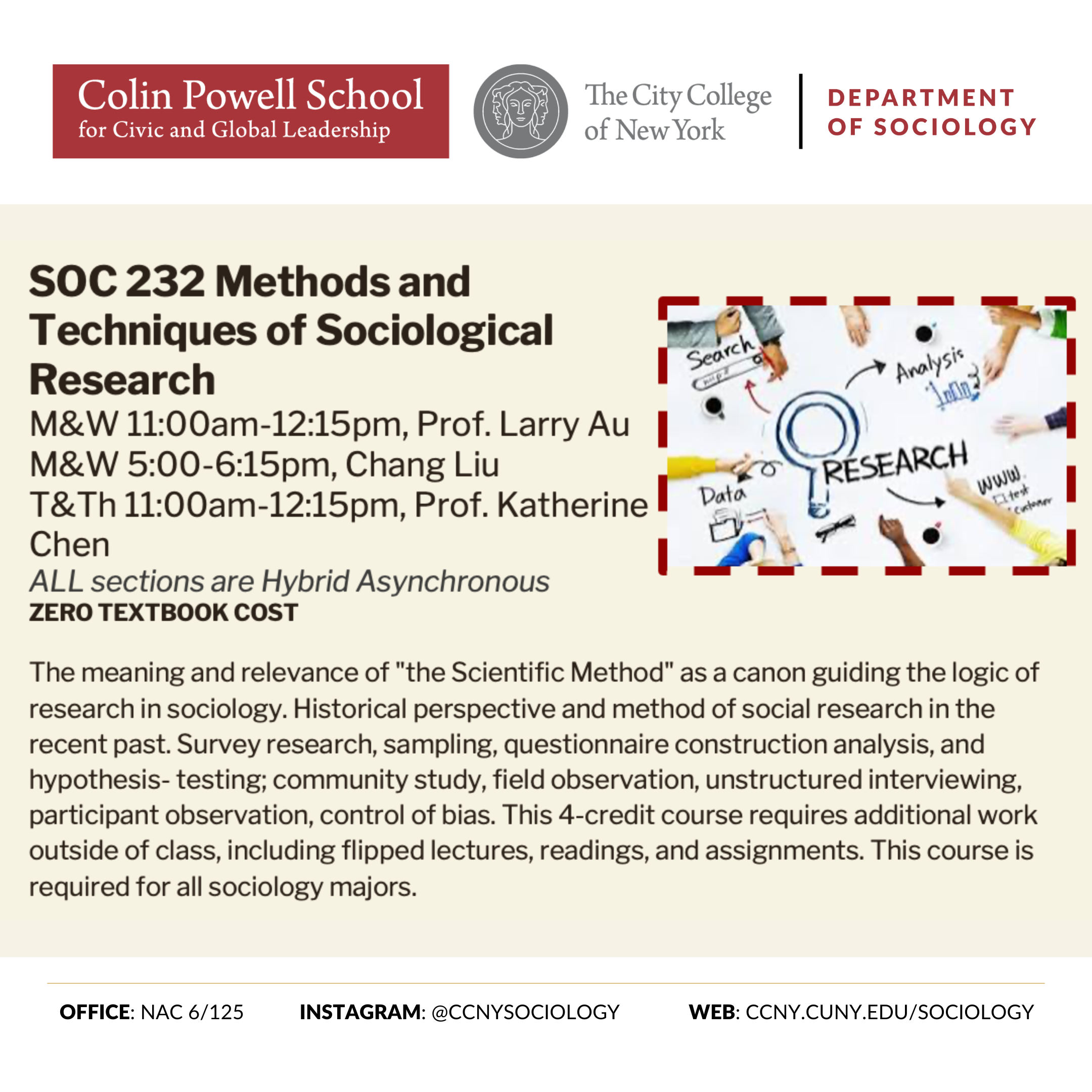
SOC 237 Foundations of Sociological Theory (4 Credits)
M&W 6:30-7:45pm, instructor TBD
T&Th 11am-12:15pm, Prof. Maritsa Poros
Hybrid Asynchronous
ZERO TEXTBOOK COST
The roots of modern sociology in the ideas of nineteenth and early twentieth century theorists, such as Marx, Weber, Durkheim, Simmel, Veblen and Cooley, with emphasis on the intellectual and social context and current relevance of the concepts and propositions they developed. This 4-credit course requires additional work outside of class, including flipped lectures, readings, and assignments. This course is required for all sociology majors.
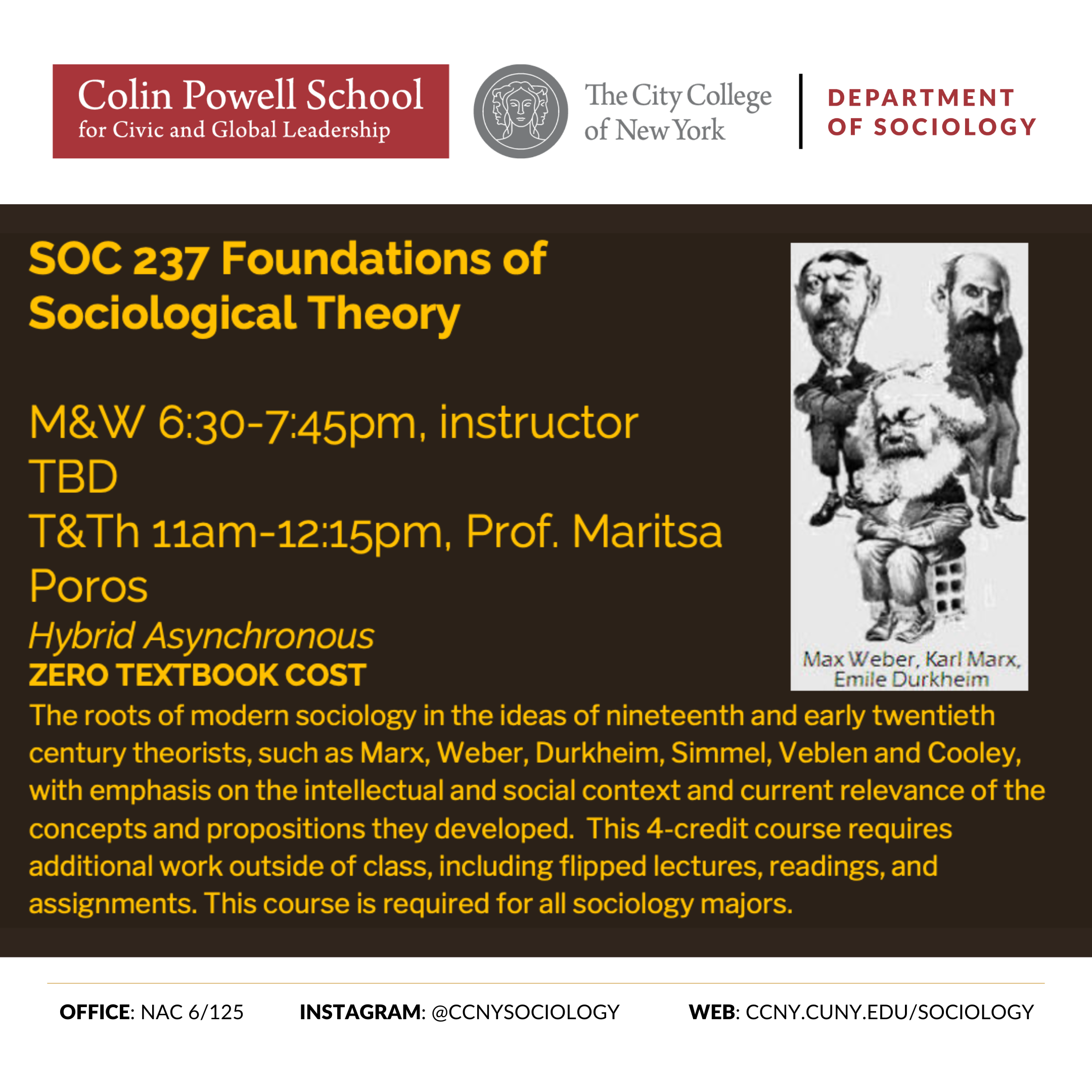
SOC 241 Criminology (3 Credits)
T&Th 6:30-7:45pm
In-Person
Instructor Ian Heller, J.D.
This course will introduce students to contemporary theories in criminology. It also will discuss the societal implications of criminal justice policies, situate those policies in their social and historical contexts, and delineate key criminological concepts within those policies.
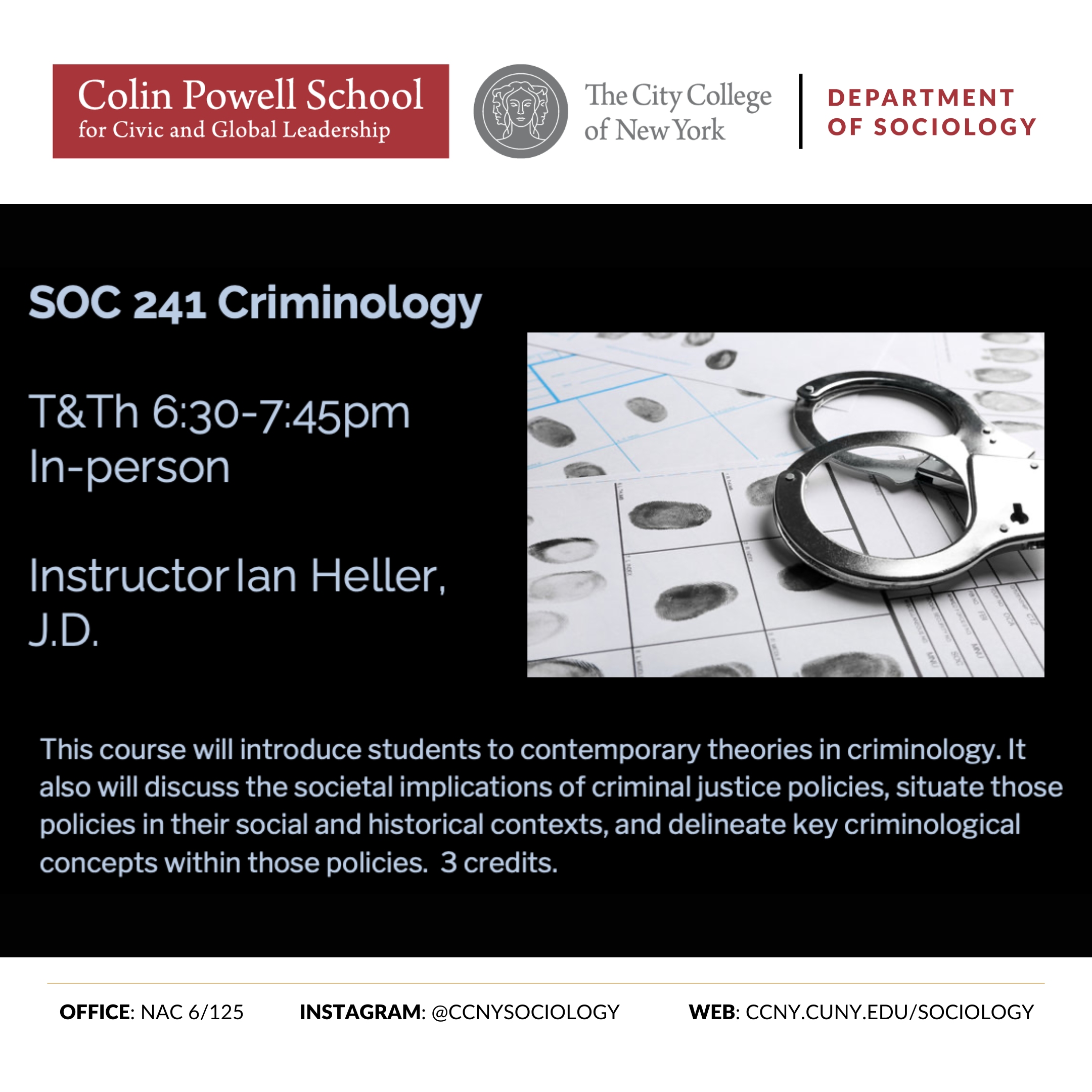
SOC 244 Principles of Social Work
T&Th 5:00-6:15pm
In-Person
Instructor
Siobhan Pokorney, LCSW
Introduction to principles of group work, case work, and community action. Primarily designed for those planning a career in Social Work. 3 credits.
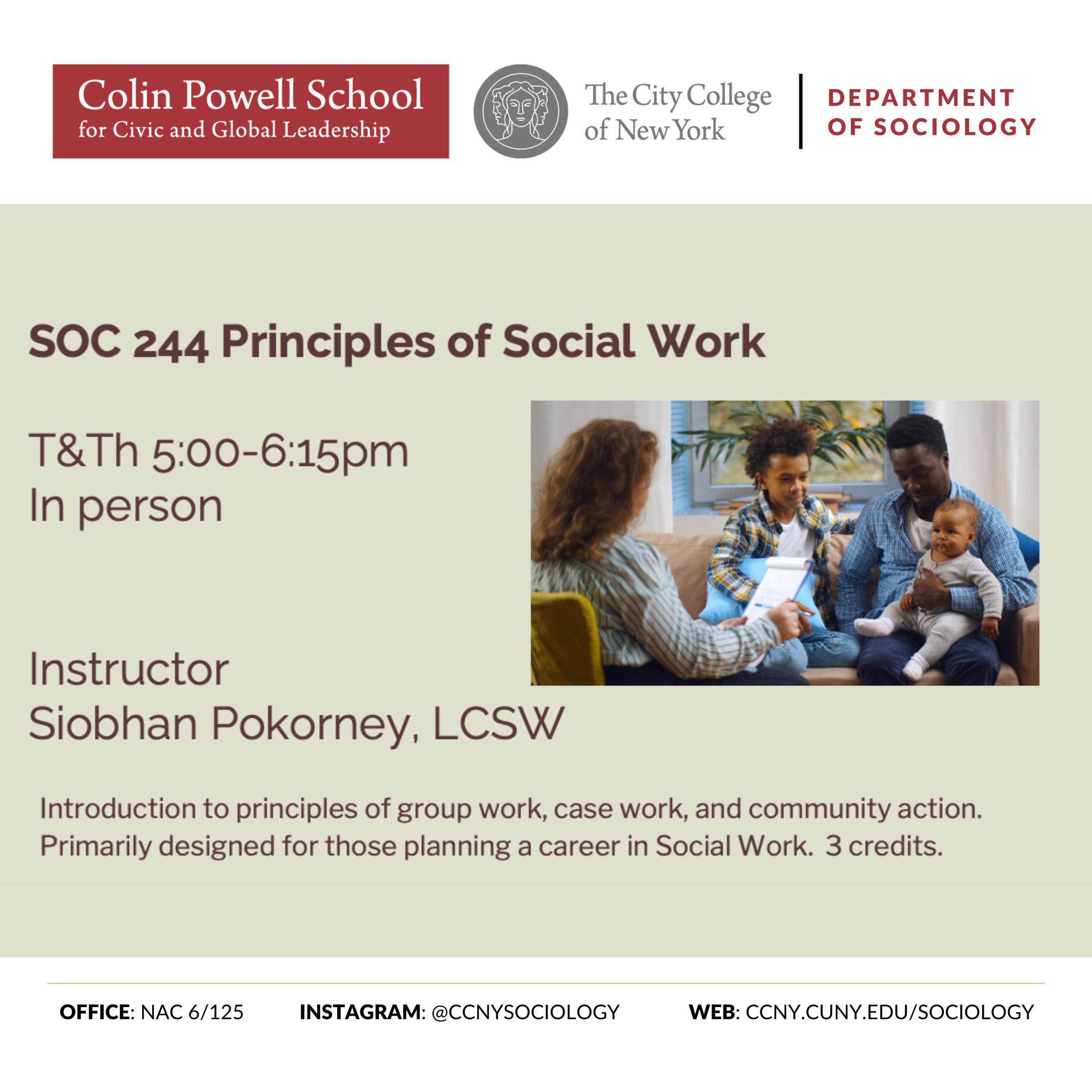
SOC 250 Mass Communication (3 Credits)
T&Th 2:00-3:15pm
In-Person
Instructor: Nicole Sarette
The character of mass society in comparison with earlier forms. "High" culture and "pop" culture and the mass media of communications. Social effects of the mass media and the problem of public control.
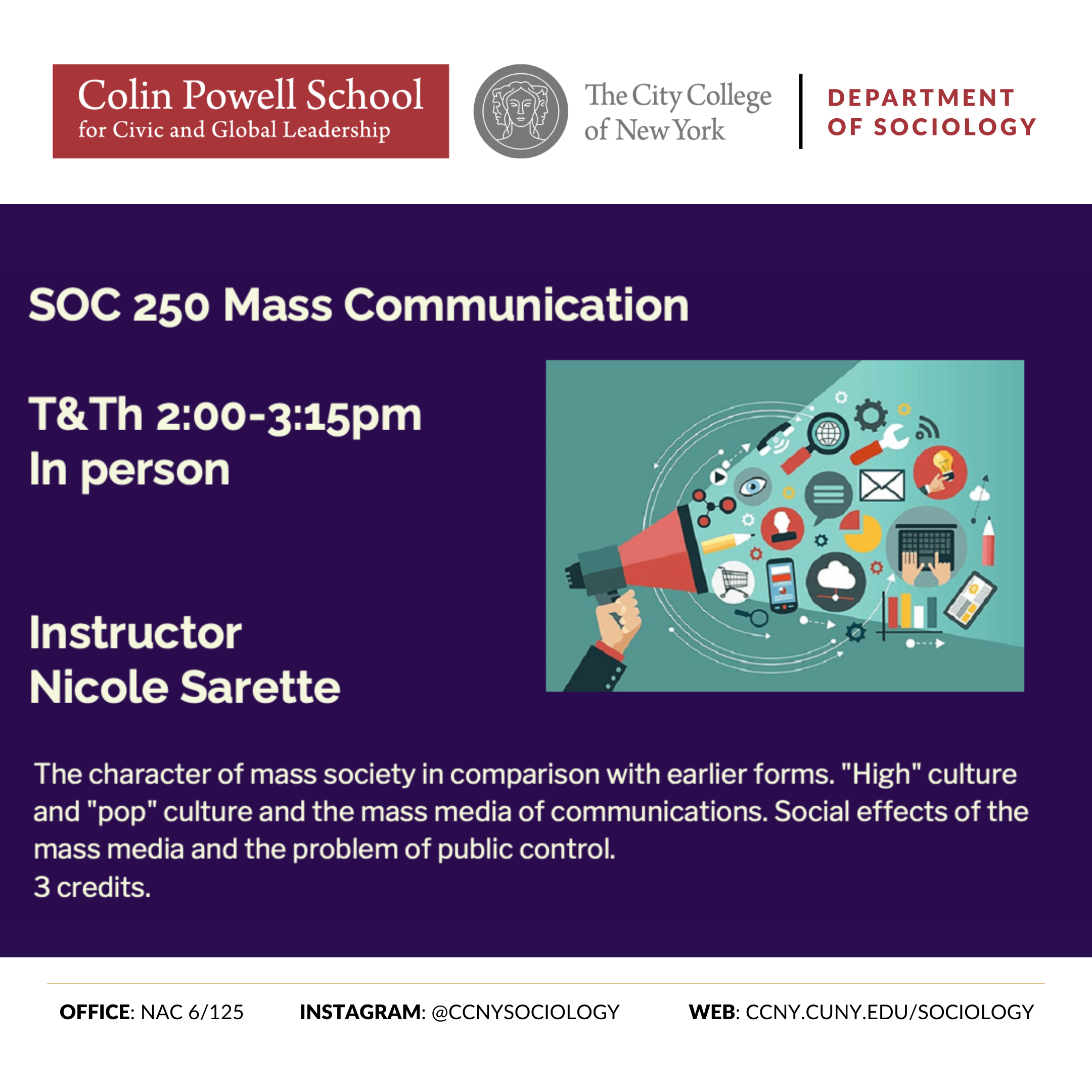
SOC 251 Urban Sociology (3 Credits)
M&W 12:30pm-1:45pm
In-Person
Prof. Gwendolyn Dordick
Nature and origins of the modern city, and of community life within and in relation to the metropolis. Urbanization as a process. Types of cities and urban communities. The changing nature of contemporary cities, urban development and the dilemmas of growth.
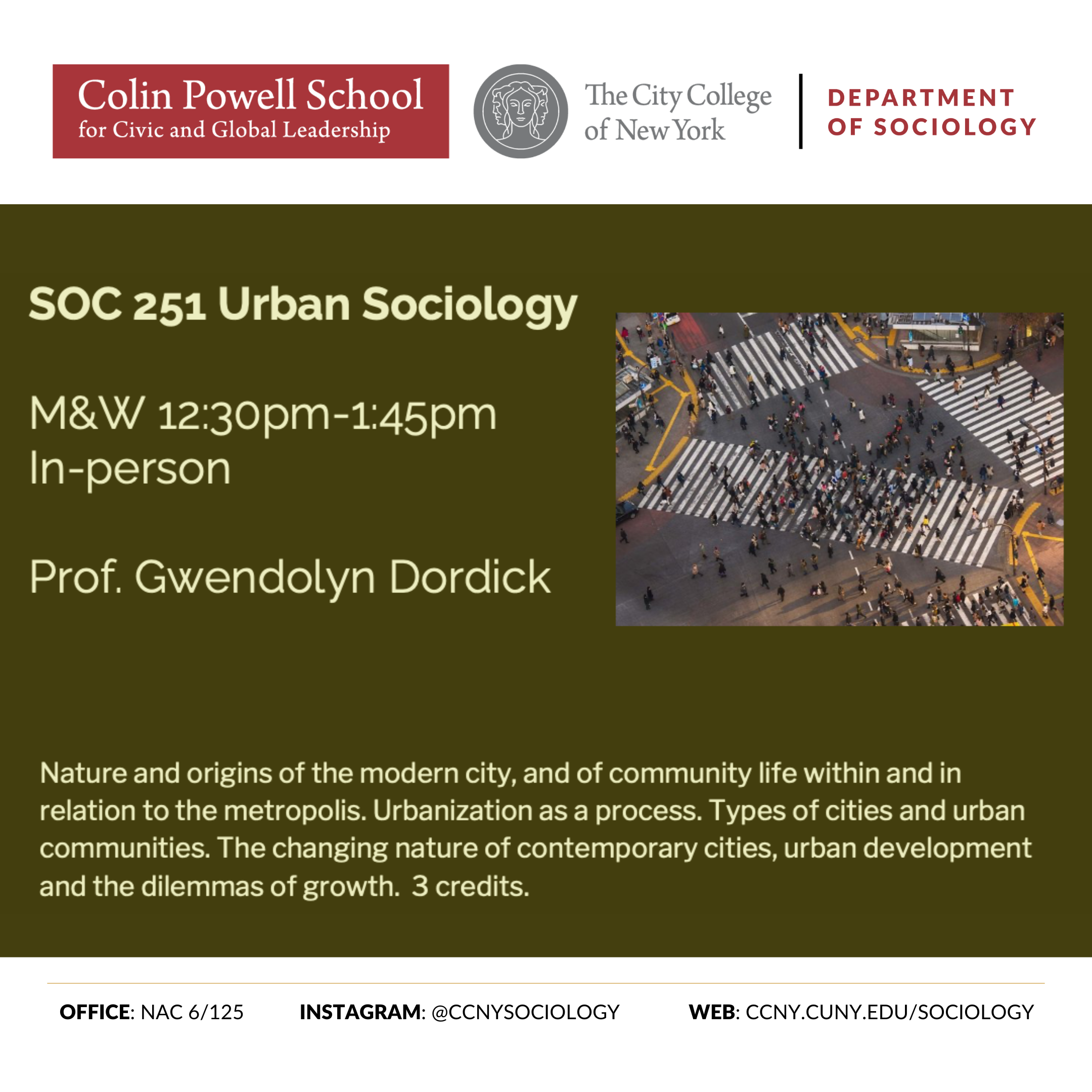
SOC 270 Sociology of Health and Illness (3 Credits)
M&W 5:00-6:15pm
In-Person
Instructor: TBA
This course examines health, illness, disability, and medicine from a social perspective. Topics may include: epidemiology, historical transitions in population health, social and cultural analysis of health and disease, medicine as profession and work practice, health policy, and the nature and role of health-related knowledge in professional and popular contexts.
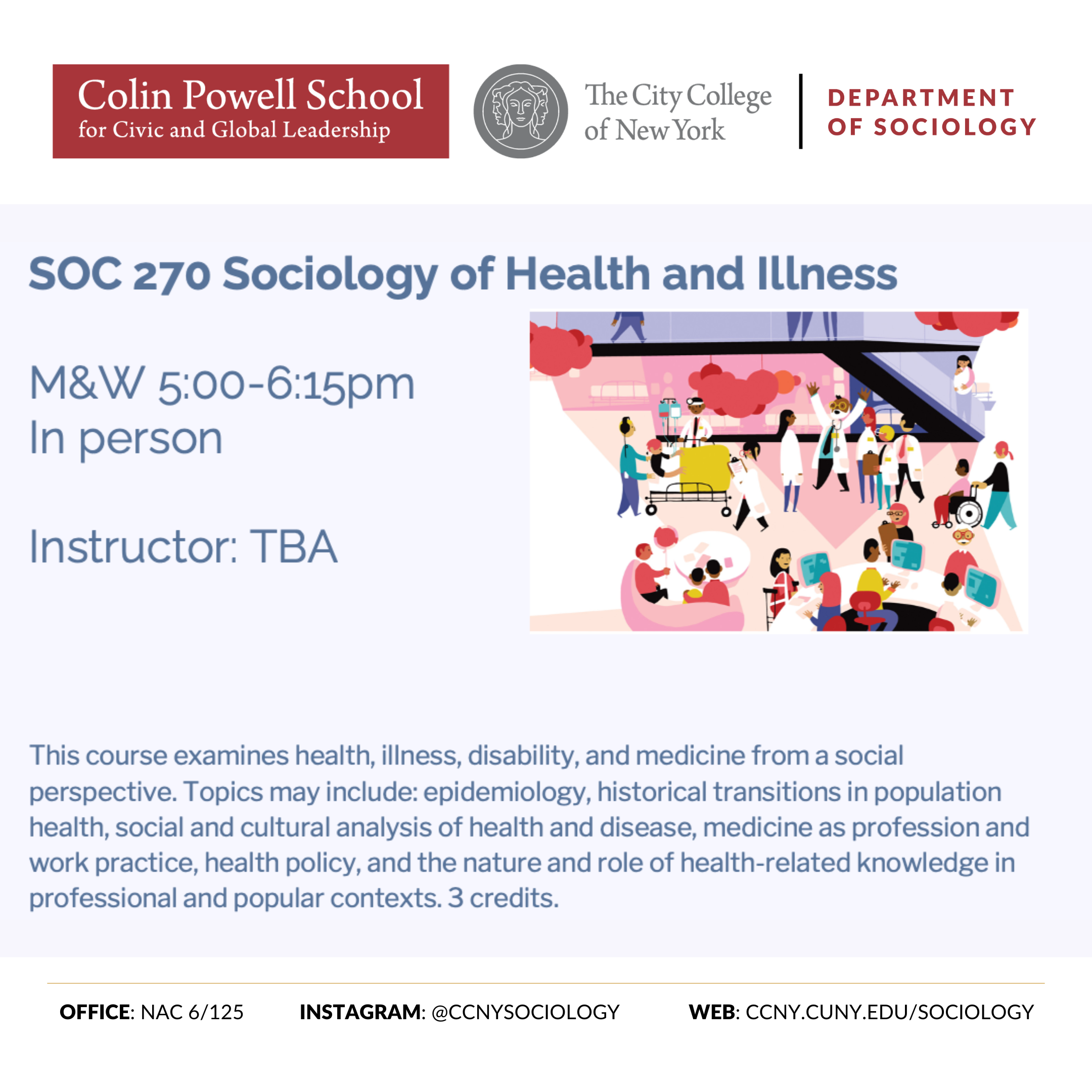
SOC 31122/LALS 39700/WS 31112 Daughters of Immigrants: Inequality and Social Mobility (3 Credits)
T&Th: 3:30-4:45pm
In-Person
Prof. Norma Fuentes-Mayorga
How do immigration, families, and job markets affect youths’ experiences in the US? This course introduces the study of immigration, stratification, and social mobility; it focuses on how various forms of inequality, including parents’ education and occupation, affect what kinds of jobs and education children can attain in their host society. This course shows how widening patterns of class, racial, and social inequality impact different immigrant youths social mobility, including who they can choose as spouses/partners. The course examines how experiences are shaped by access to higher education, changing immigration policies, and the expansion of low-wage, service work and digitized labor markets.
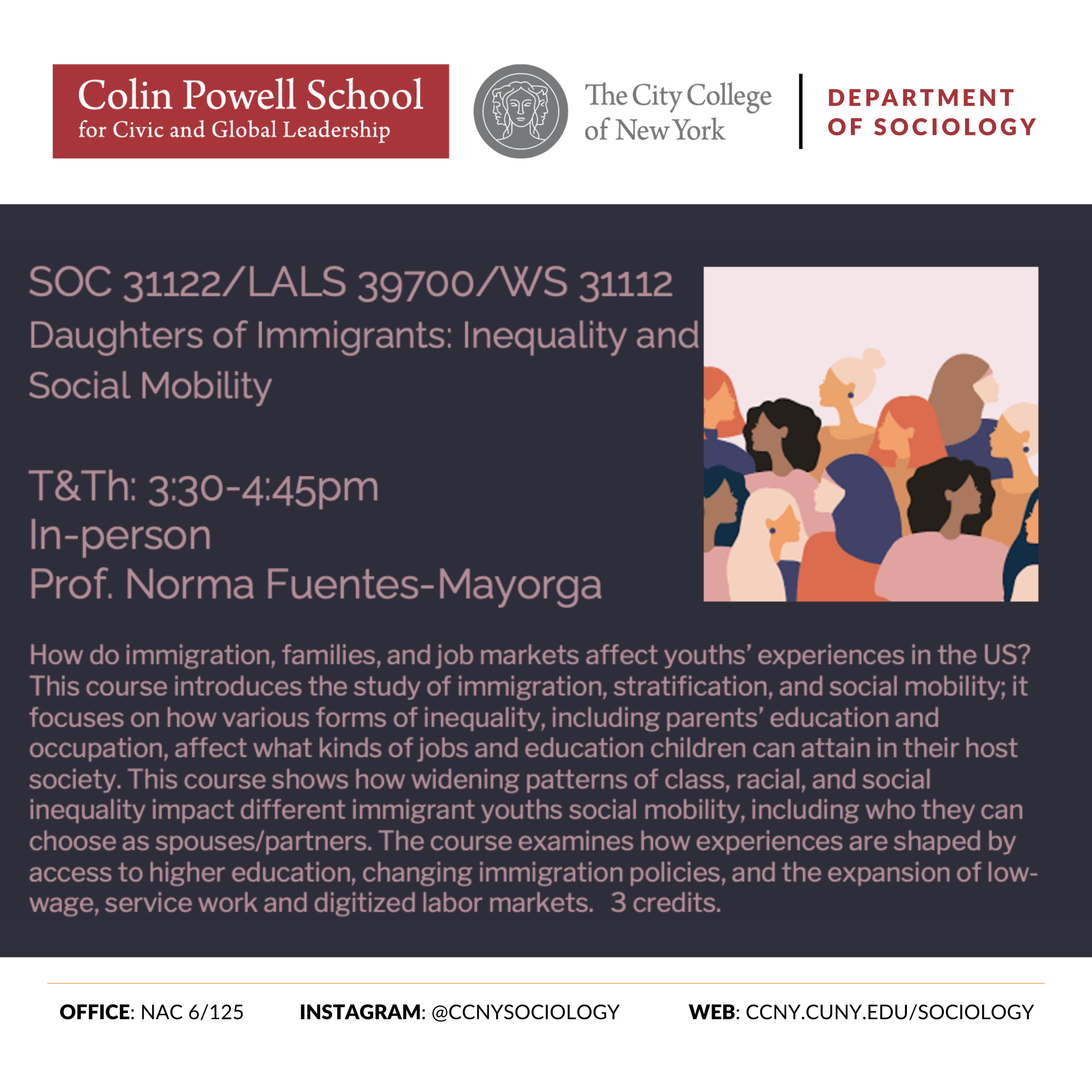
SOC 31140/ INTL 31140 Human Mobility and Social Change (3 Credits)
T&Th 9:30-10:45am
In-Person
Prof. Maritsa Poros
This course explores the causes, patterns and impacts of human migration and social change, including forced migration, displacement and the experiences of refugees. Themes will include: theories of migration; globalization, development and migration; securitization of immigration; human smuggling and trafficking; racism and exclusion; transnationalism and diasporas; conflict, the environment and forced migration; and austerity and mass expulsion. The class will offer a global perspective as well as focusing on American immigration.
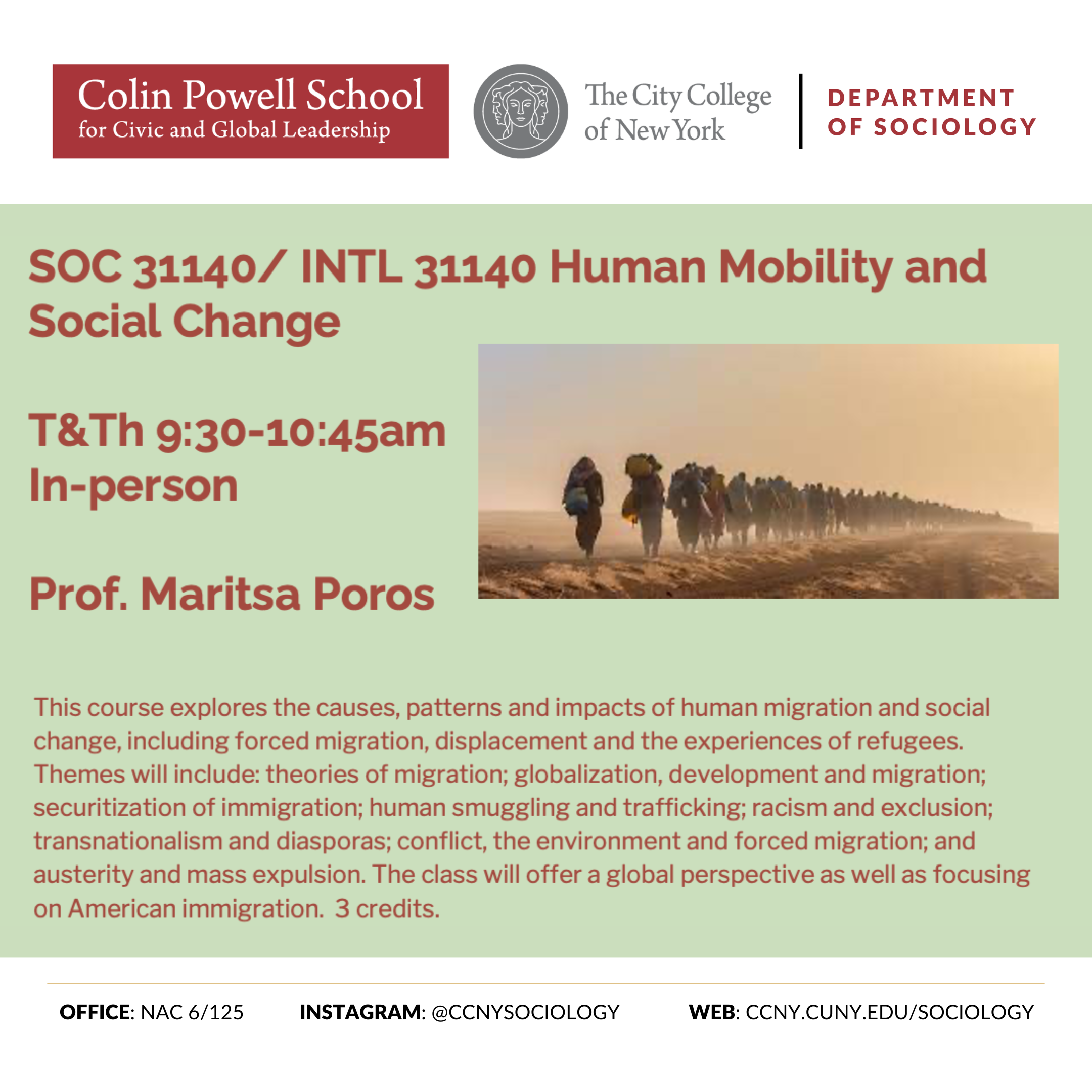
SOC 31221/ BLST 31221 / INTL 31221 Legacies of Inequalities: Understanding Divergent Socioeconomic Developments in the Americas (3 Credits)
T&Th 6:30-7:45pm
In-Person
Prof. Ramona Hernandez
Why have some countries in the Americas struggled economically while others have thrived? What has been the impact of European colonization, the decimation of the aboriginal populations, and the arrival of millions of enslaved African Black people? This socio-historical survey course contrasts the differential socioeconomic developments of Latin America, the Caribbean, and the U.S. using writings from Dominican sociologist Pedro Francisco Bonó, Peruvian economist José Carlos Mariátegui, Cuban humanist José Martí, Puerto Rican humanist Luis Llorens Torres, Argentinian economist Raul Prebish, U.S. sociologist Immanuel Wallerstein, and other scholars. In addition, we delve into the influences of foundational, widely translated texts such as Black Skin, White Masks by Martinican psychologist Franz Fanon, Pedagogy of the Oppressed by Brazilian philosopher Paulo Freire, and Open Veins of Latin America by Uruguayan journalist Eduardo Galeano.
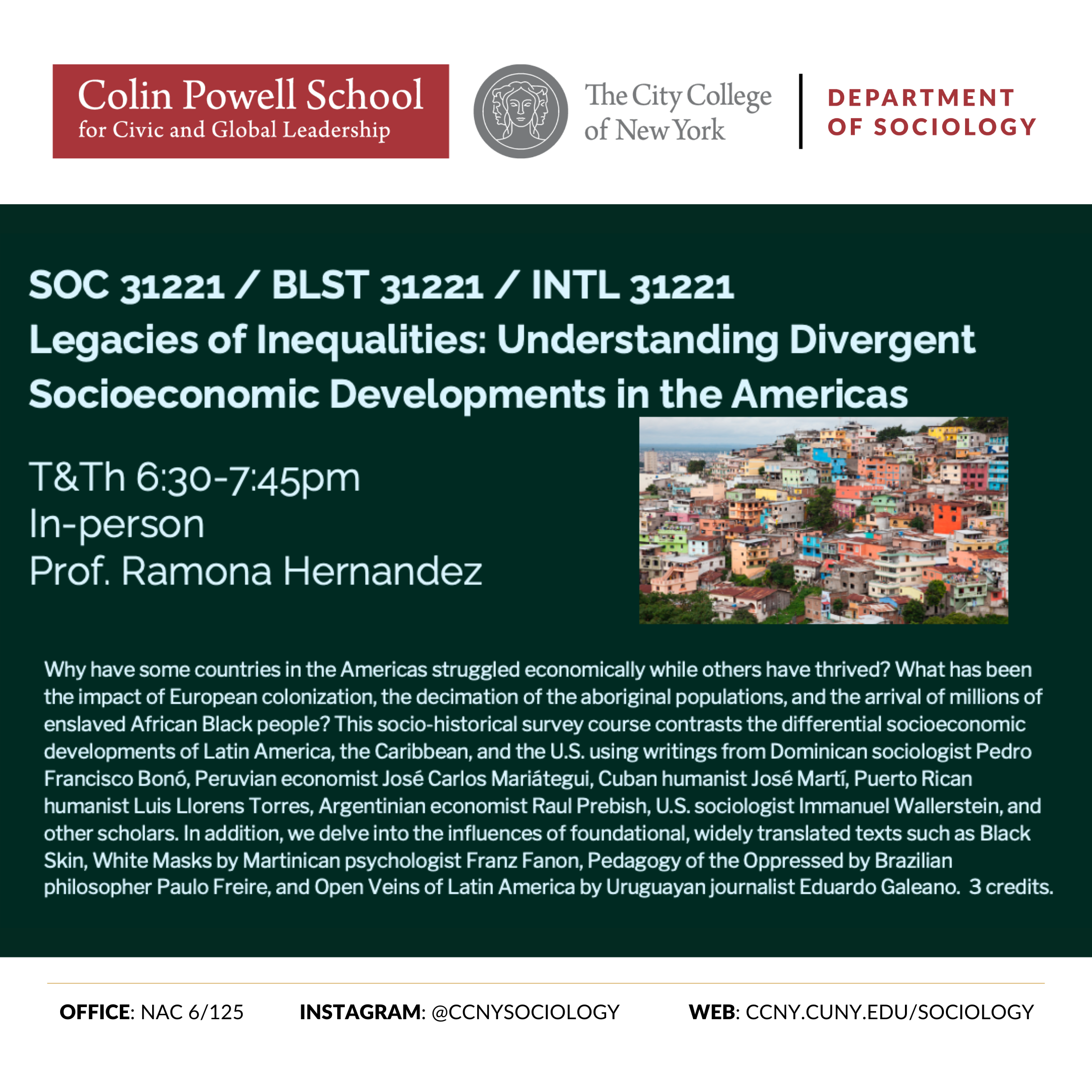
SOC 32200 Poverty and Inequality (3 Credits)
M&W 12:30-1:45pm
In-Person
Prof. Yana Kucheva
This course examines the nature of inequality in the contemporary U.S. with some reference to other times and places. Students are introduced to key scientific breakthroughs that are foundational to our current understanding of the causes and consequences of poverty.
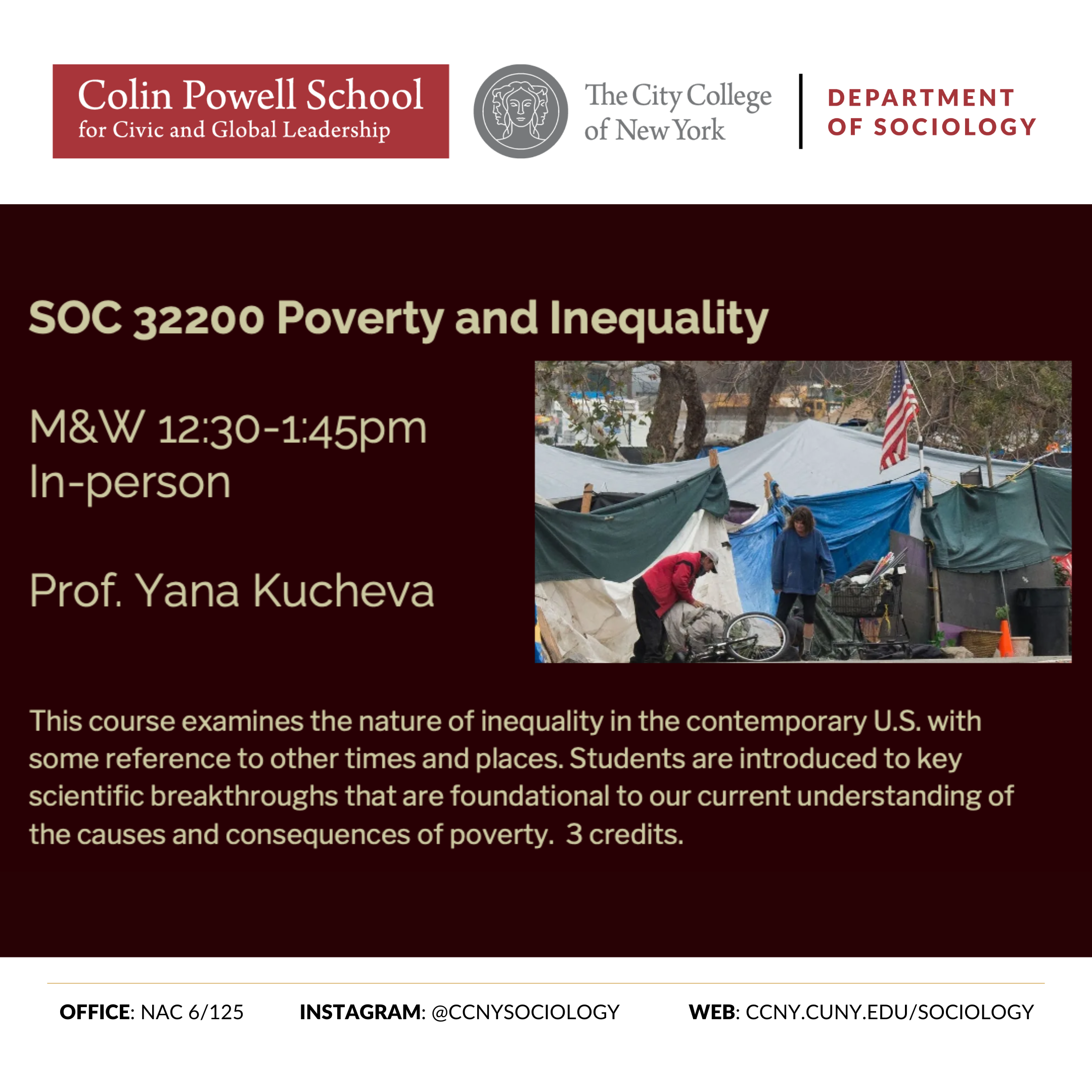
SOC 330 Digital Sociology (Special Topics in Science, Knowledge, and Technology) (3 Credits)
T&Th 3:30-4:45pm
In-Person
Instructor Nicole Sarette
This course explores how the rise of the internet and digital technologies is reshaping human behavior, identity, and group norms. Taking a critical approach, we examine social media, artificial intelligence, and other digital platforms to uncover how they create, reinforce, and interact with class, racial, and gender inequalities. For those curious about the social dynamics of our digital world, this course challenges conventional perspectives on the technologies shaping our future.
Note: This course was previously numbered SOC 31359; if you already earned credit for SOC 31359, please take another course.
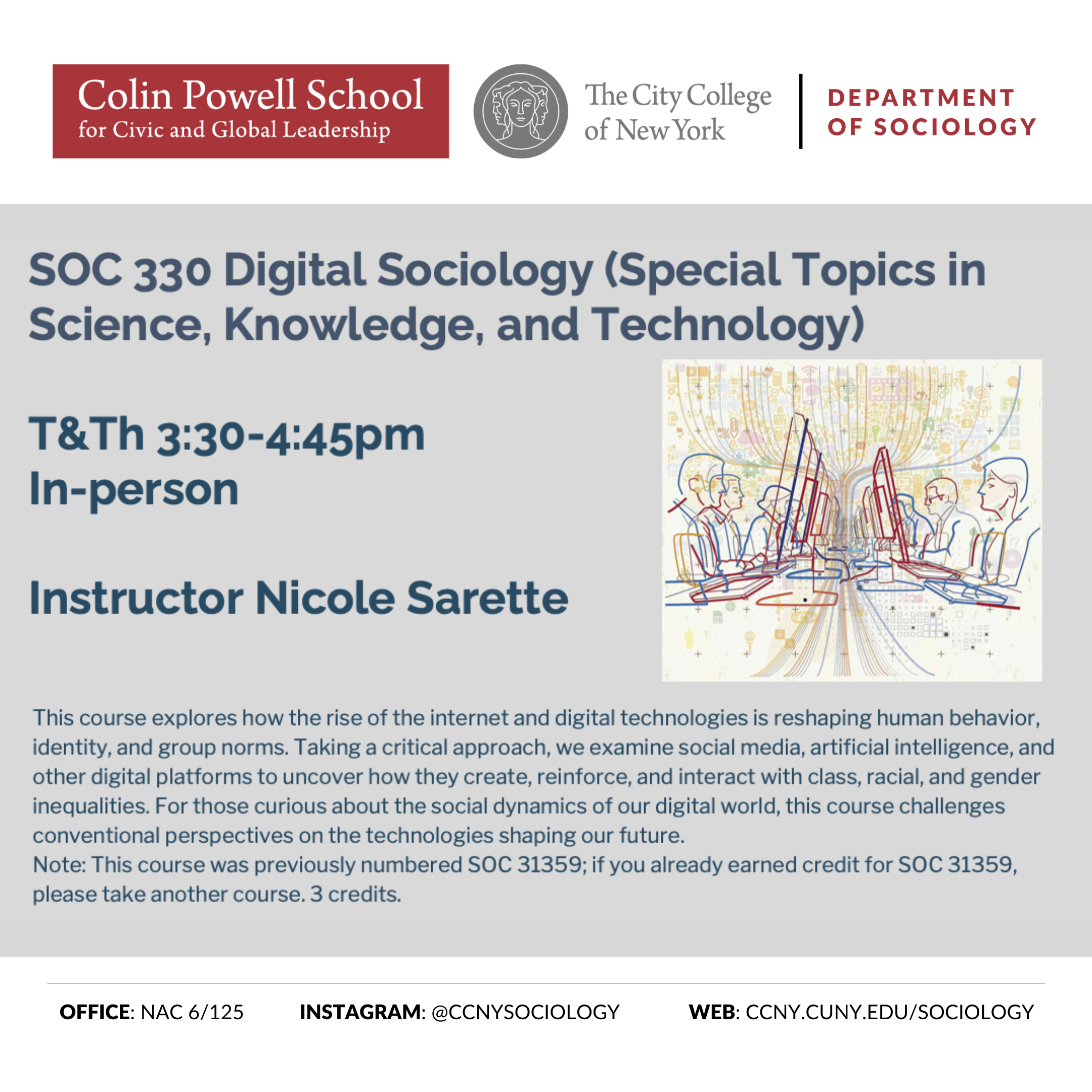
SOC 332 Learning to Care: How Doctors and Health Professionals Deliver Medical Care (Special Topics in Health and Mental Health) (3 Credits)
M&W 2:00-3:15pm
In-Person
Prof. Larry Au
How do doctors and other medical professionals, such as nurses and EMTs, learn to provide medical care? How do professionals gain authority over health and illness, and how do they confront challenges to their expertise? How do medical professionals collaborate to care for their patients? This class explores the social organization of the medical field in the U.S. and globally through an examination of medical education, medical training, and the medical professions. Other topics covered include how doctors communicate with patients, how medical professionals cope with burnout, how medicine is integrating artificial intelligence, and how doctors work with patients using traditional medicines.
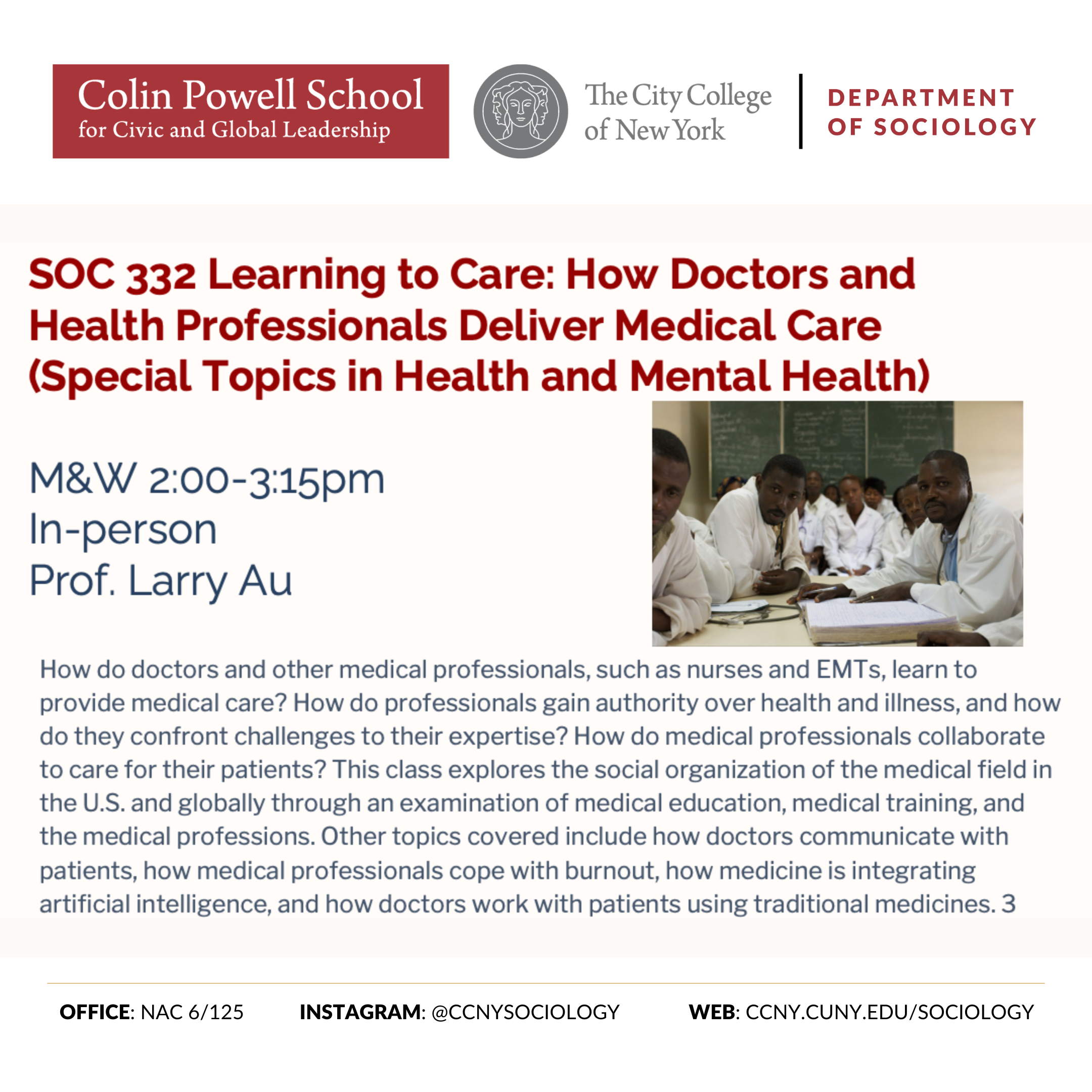
SOC 332 / PSY 31159 Artificial Intelligence (AI) in Medicine: Ethical Issues in the Future of Health
(Special Topics in Health and Mental Health) )(3 credits)
M&W 6:30-7:45pm
In-Person
Instructor: Elise Li Zheng
Rapidly developments in Artificial Intelligence (AI) is changing healthcare possibilities through Big Data, advanced algorithms and computing power. Proponents of AI promise that this technology will help treat diseases, support more informed decisions, and enhance care that improves people's physical and mental health. However, ethical challenges around personal privacy, autonomy, and data justice raise questions about AI use and threats to human well-being. This class introduces the field of AI ethics in health and healthcare and uses case studies to debate the risks and benefits of using AI, helping students analyze its role in healthcare.
This course will be cross-listed with PSY; info forthcoming.
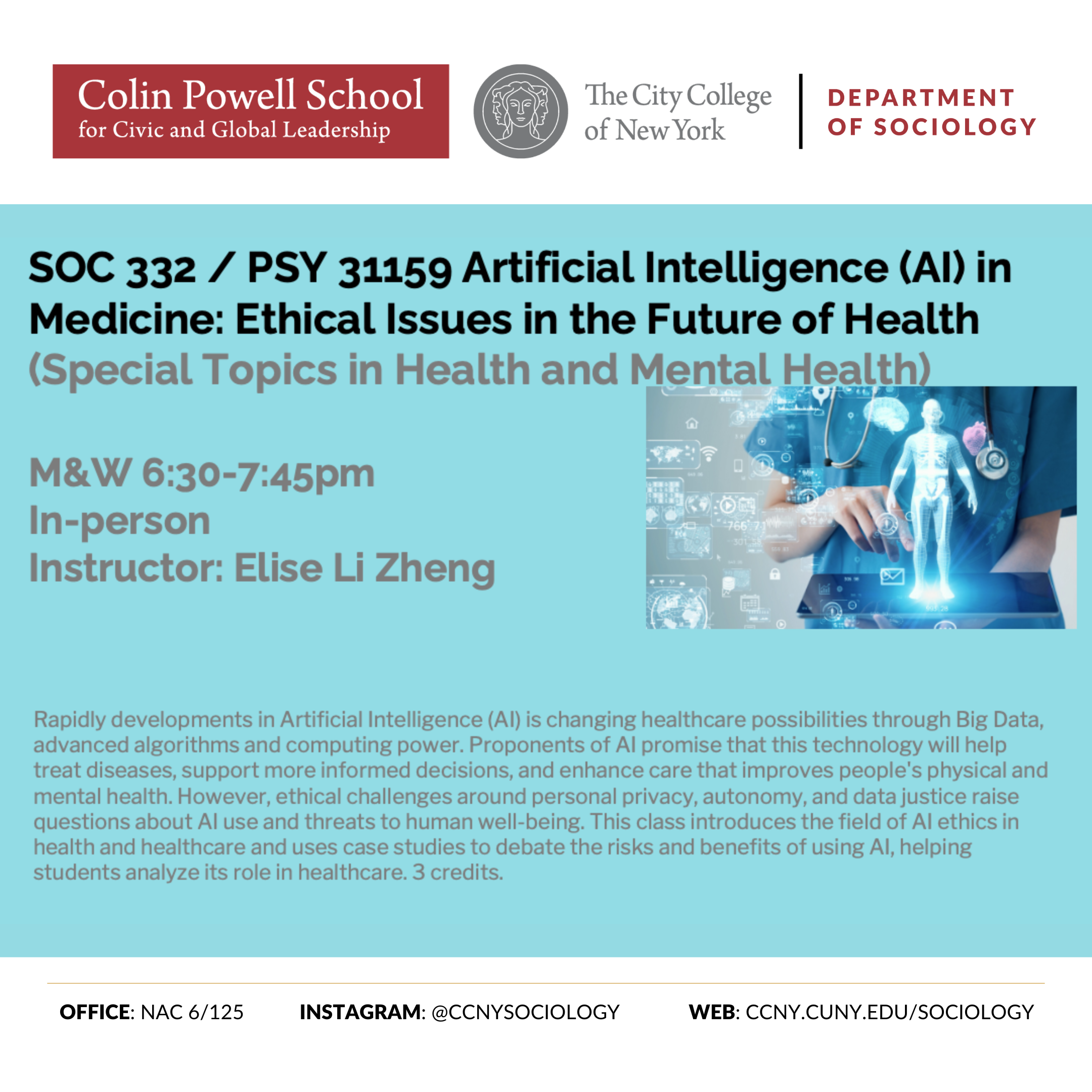
SOC 333: Self and Society: Anxiety and the Social Self (Special Topics in Social Psychology) (3 Credits)
M&W 3:30-4:45pm
In-Person
Instructor Edward Silver, PhD
How do social performance and social groups provoke, shape, and structure our experience of anxiety? How does anxiety and its management shape our self-understanding as social agents? Has the experience of anxiety changed in relation to changing social conditions? We will explore how anxiety has been defined in clinical terms and contrast contemporary diagnoses with other ways it has been understood historically. We will explore anxiety from a variety of disciplinary perspectives, including existentialism, psychoanalysis, and classical social theory. We will also explore contemporary social anxiety in relation to COVID-19, ecological catastrophe, performance on social media, and social class.
Note: This course was previously numbered SOC 31157; if you have already earned credit for SOC 31157, please take another course.
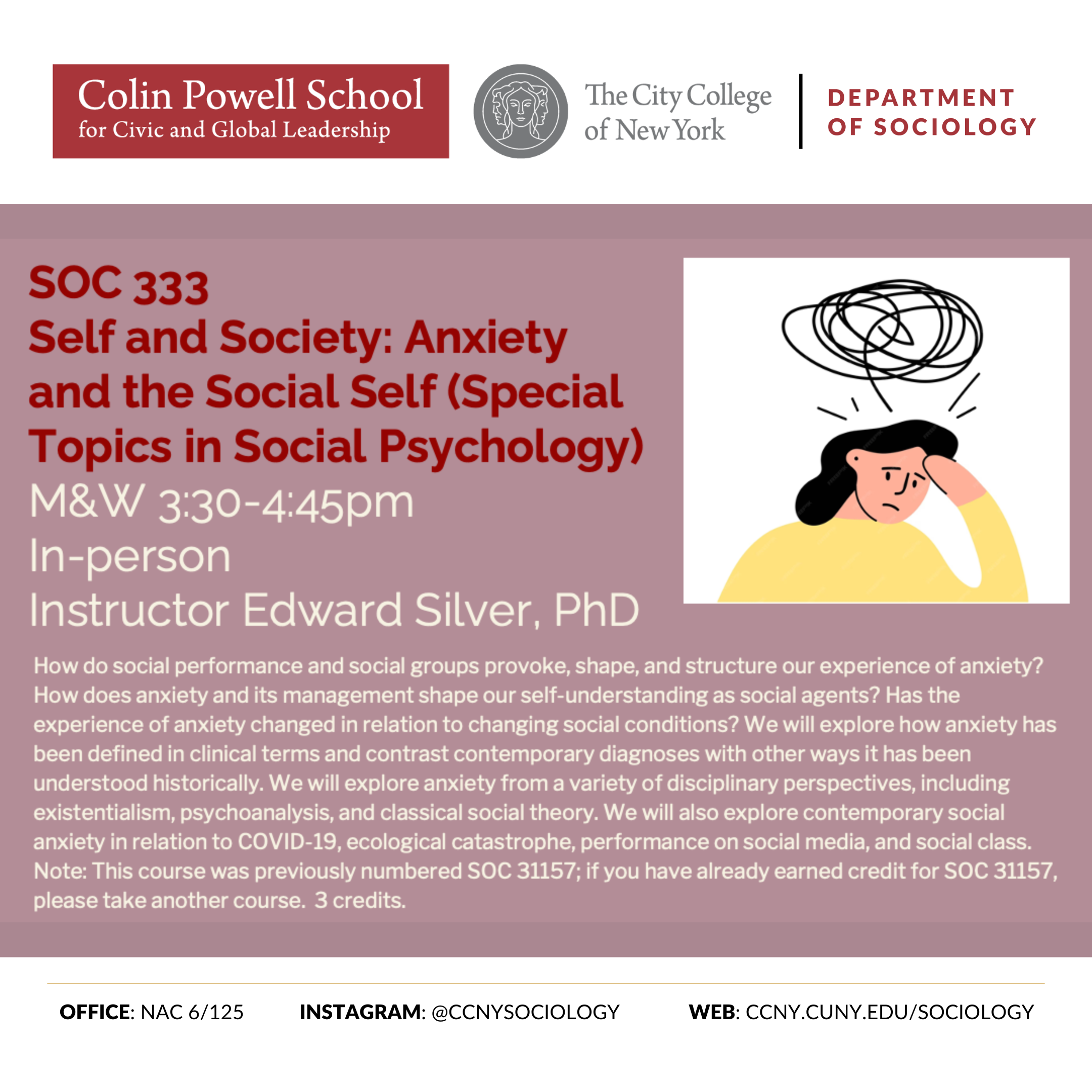
SOC 334/BLST 31155 Race, Class, and Power (Special Topics in Race and Ethnicity) (3 Credits)
M&W 11:00am-12:15pm
In-Person
Instructor Colin Ashley
How are racial and class hierarchies constructed and sustained, and how do these enable exploitation? This class explores the concepts of race and class in relationship to power through Racial Capitalism, which delves into the interlocking and intersectional workings of race and class. This course covers common sociological understandings of Race, Class, and Power while tackling the complexity, origins, and usages of the more specific category of analysis that is Racial Capitalism. We compare the US and other locales to understand how Racial Capitalism operates locally and globally. 3 credits.
Notes: If you have already earned credit for SOC 31112 or BLST 31155 Race, Class, and Power in a previous semester, please do not take this class. This course may be cross-listed with BLST 31155 Race, Class, and Power.
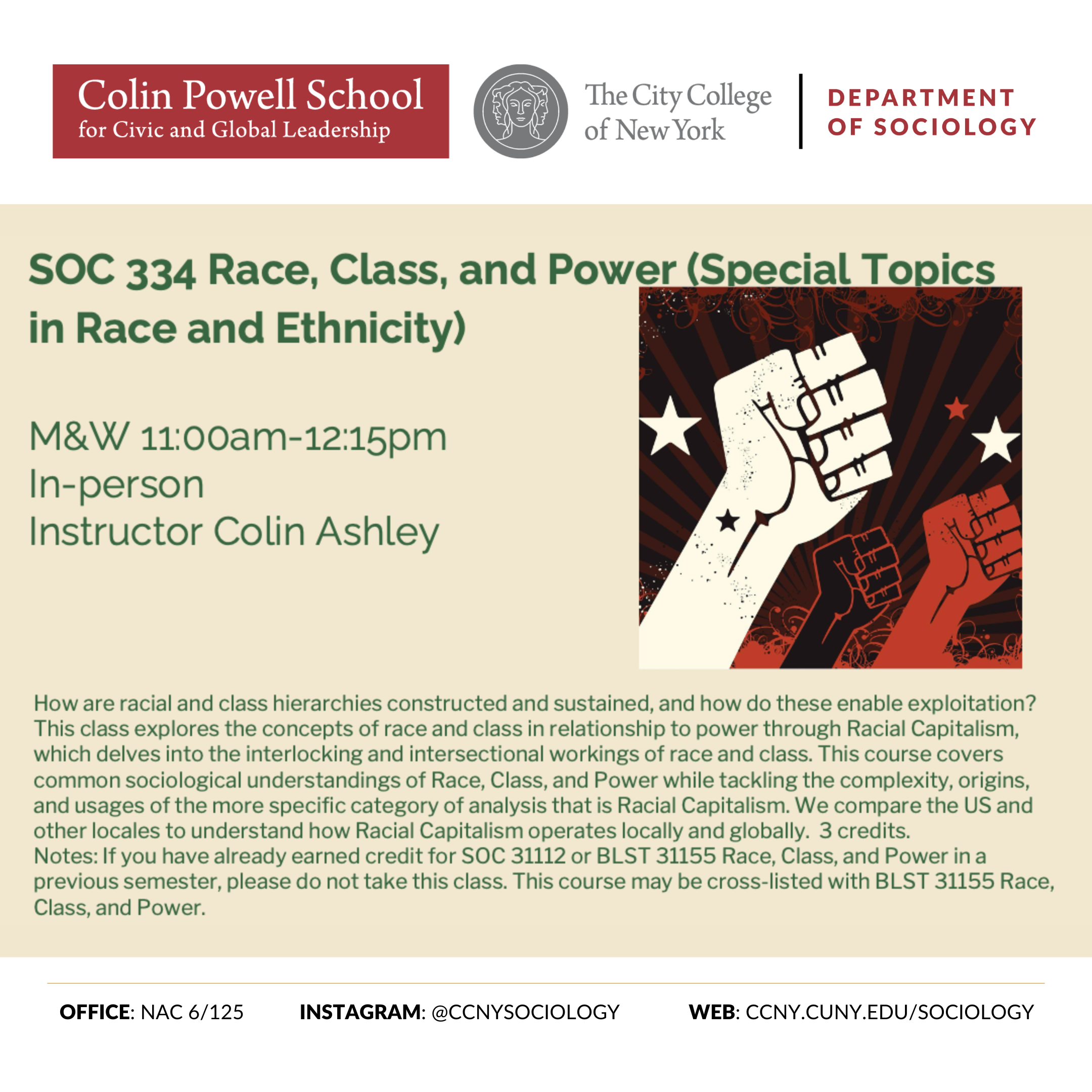
SOC 335/MCA 344 Journalism and Society: Covering Power (Topics in Culture and Media) (3 Credits)
M&W 9:30-10:45am
In-Person
Instructor Ekim Killic
Journalism is often referred to as the fourth estate, highlighting its role as a watchdog over both public and private power. This course examines how journalism intersects with political and institutional power structures while exploring the sociology of journalism. We will analyze how journalistic practices and discourse are shaped by multiple layers of power, the social patterns that emerge among journalists, and how these practices influence public perceptions of society, politics, and journalism itself—especially in the context of contemporary concerns such as fact-checking, fake news, and conflicting narratives. Students will gain an understanding of journalism’s role in covering key societal issues, including politics, immigration, the economy, race, education, criminal justice, housing, the environment, and climate change. 3 credits.
Note: If you have already earned credit for this course under its original course number SOC 31156, please take another course. This class is cross-listed with MCA 344 Journalism and Society: Covering Power.
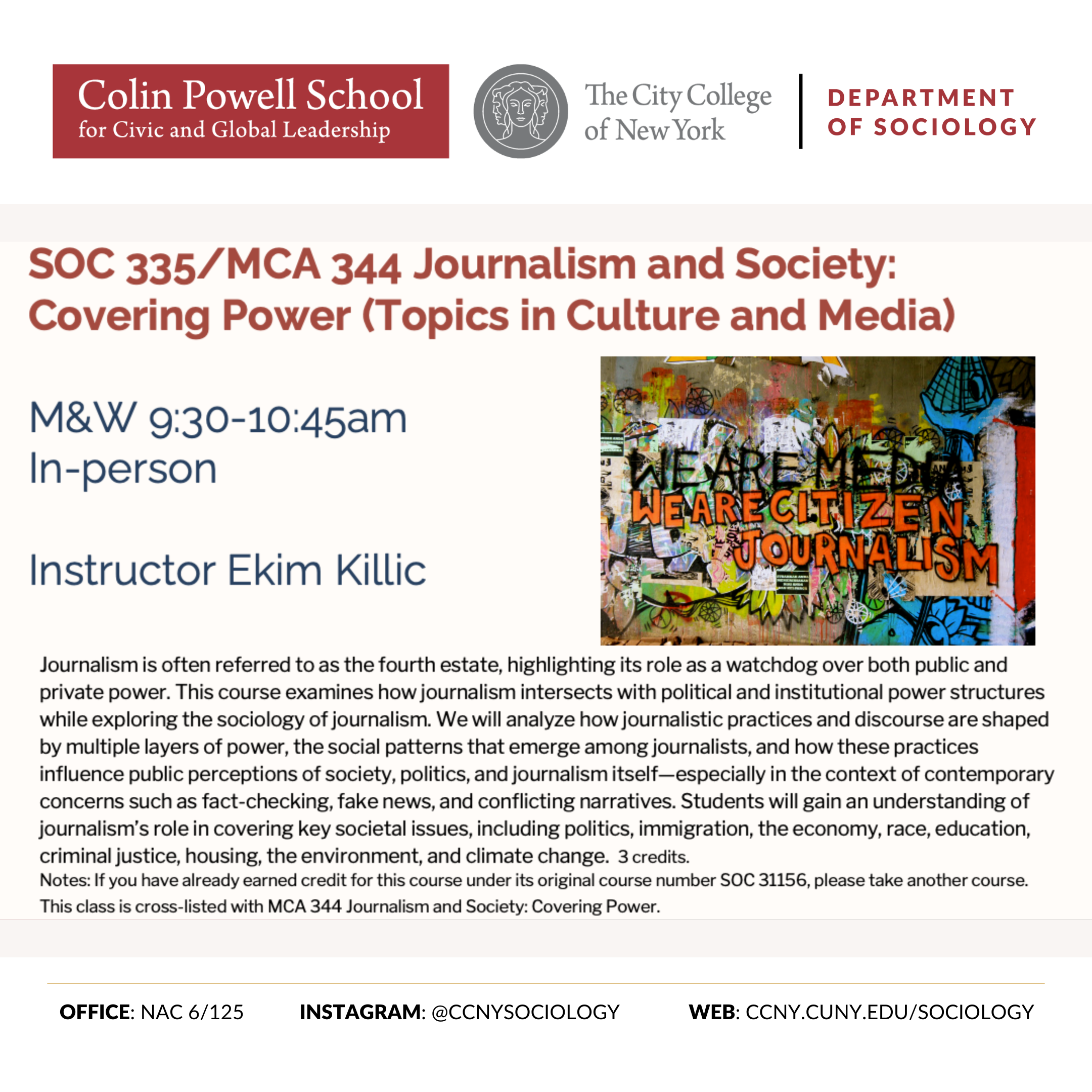
SOC 33700/LALS 396/WS XXX Gender, Technology and Inequality: From Maquilas to Ex-Machinas: Gender, Technology and Inequality (Special Topics in Latin American and Latino/a/x Studies) (3 Credits)
T&Th 11:00am-12:15pm
In-Person
Prof. Norma Fuentes-Mayorga
This course examines the work experiences of immigrant women in the U.S. and of other women in nations of Latin America and the Global South, with a focus on how their participation in digital economies shape new forms of development, migration and the racialization of labor. Questions guiding this course include: What kinds of labor and workers drive new digital economies? How do industrial jobs in “maquilas” or factories owned by international capitalists in developing nations, like the Dominican Republic, Mexico, or the Philippines, affect the lives of women and their eventual migration elsewhere? What technological innovations and mechanisms lead women to find jobs in data processing plants, call centers, or virtual sex work? This course familiarizes students with studies on economic development and international migration, gender and feminist thought in AI and Cybernetics, and philosophies of technology and communication. Students will learn to conduct critical analysis of how technological development impacts the lives and status of women, especially among Latinas and Asians, who work as invisible laborers at the bottom rung of new, digital economies.
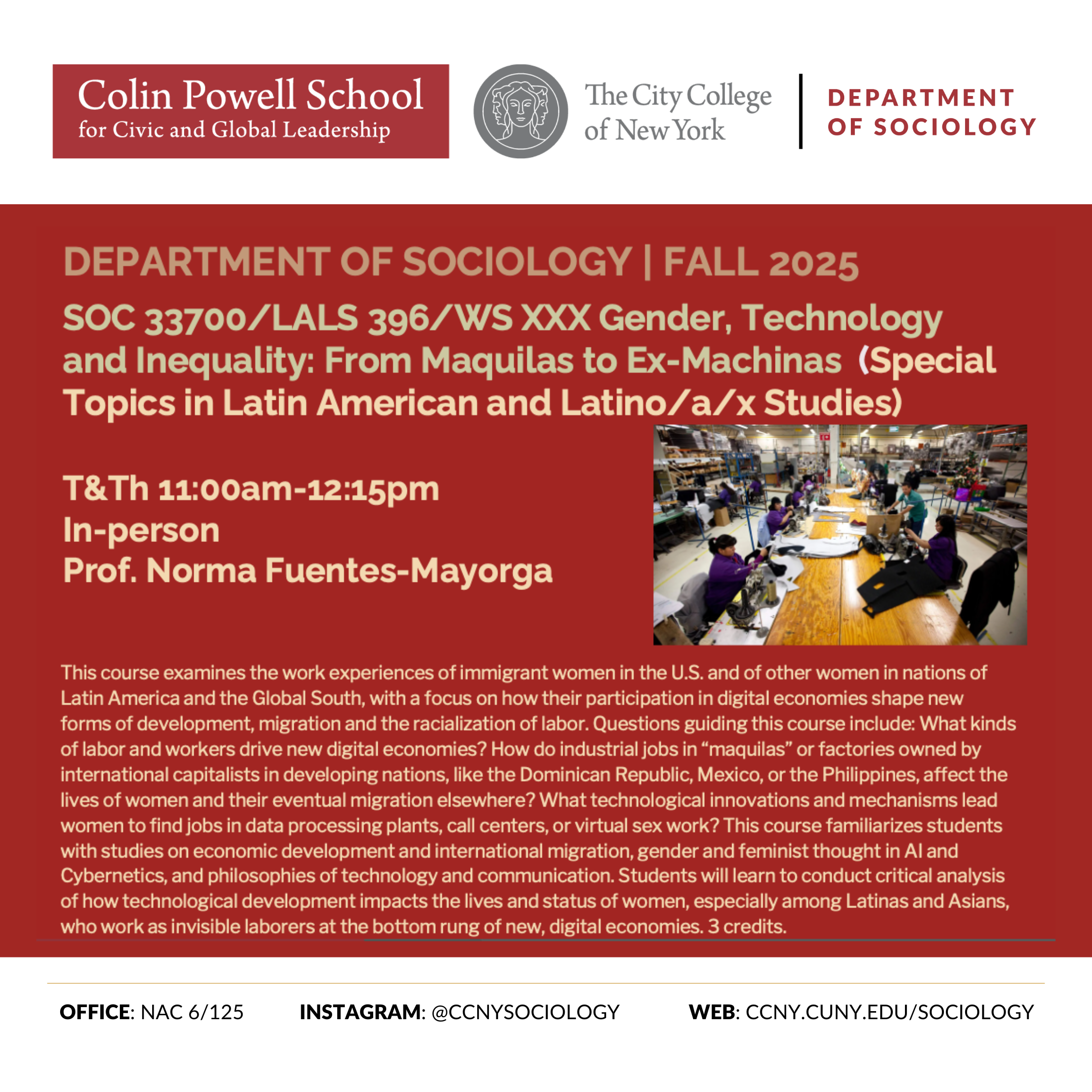
SOC 38211 Drugs and Society (3 Credits)
M&W 2:00-3:15pm
In-Person
Instructor TBD
This course examines psychoactive drug use in social and historical context, and includes both illegal and medical drug use. Topics may include: varying patterns of use, addiction and treatment, epidemiology, drug control policy and enforcement, drug markets, prescribing practice, and very basic pharmacology (how drugs work in the body).
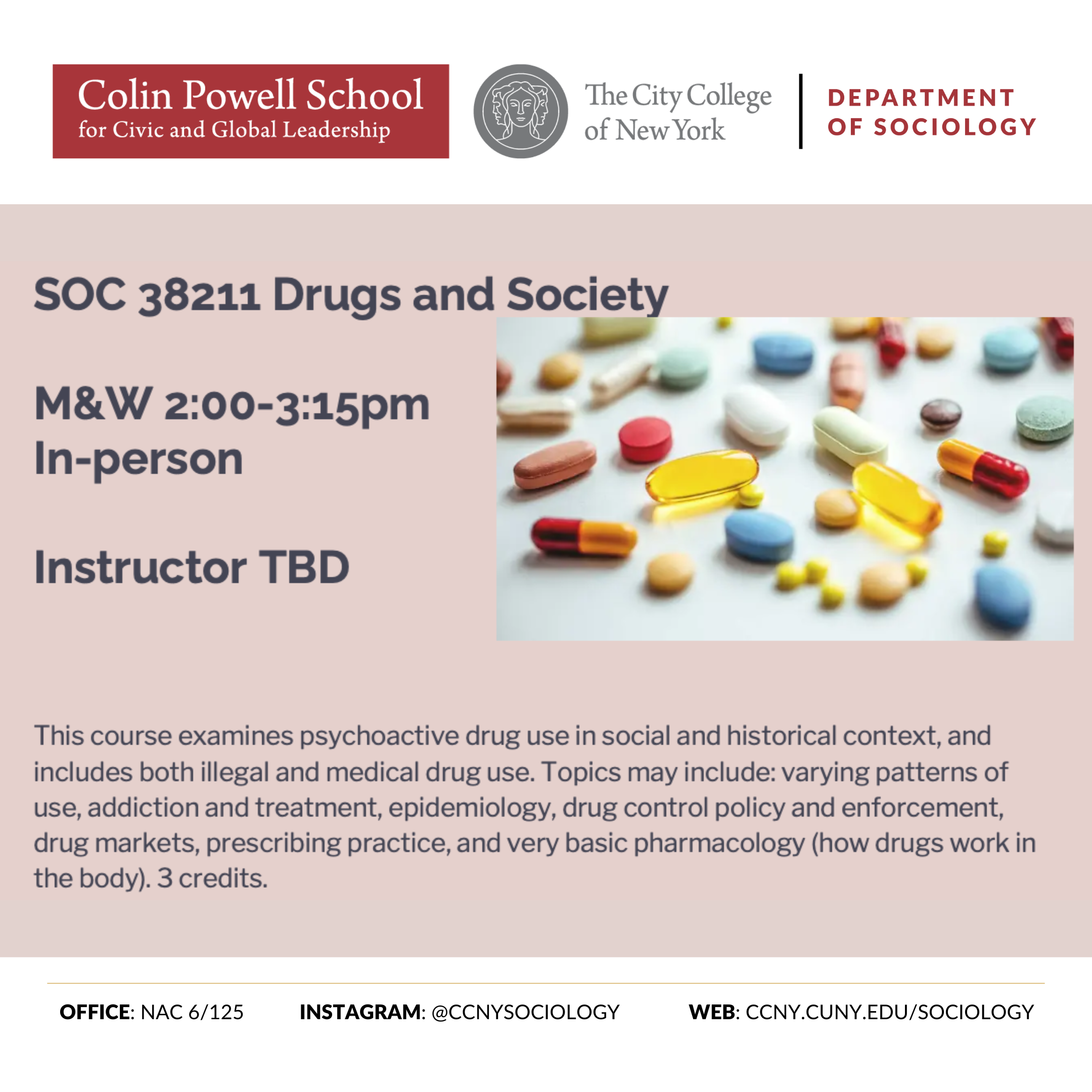
SOC 31199: Asian American Experiences: Immigration, Exclusion & Belonging (3 Credits)
Monday & Wednesday 3:30PM-4:45PM
Rikha Venturanza, Ph.D
How do race, ethnicity, immigration status, and evolving U.S. policies influence the experiences of Asian Americans? Conversely, how have Asian Americans resisted exclusion and navigated their social and political standing? Using sociological and interdisciplinary theories, this course explores the interplay of social, political and historical factors shaping past and contemporary Asian American experiences.
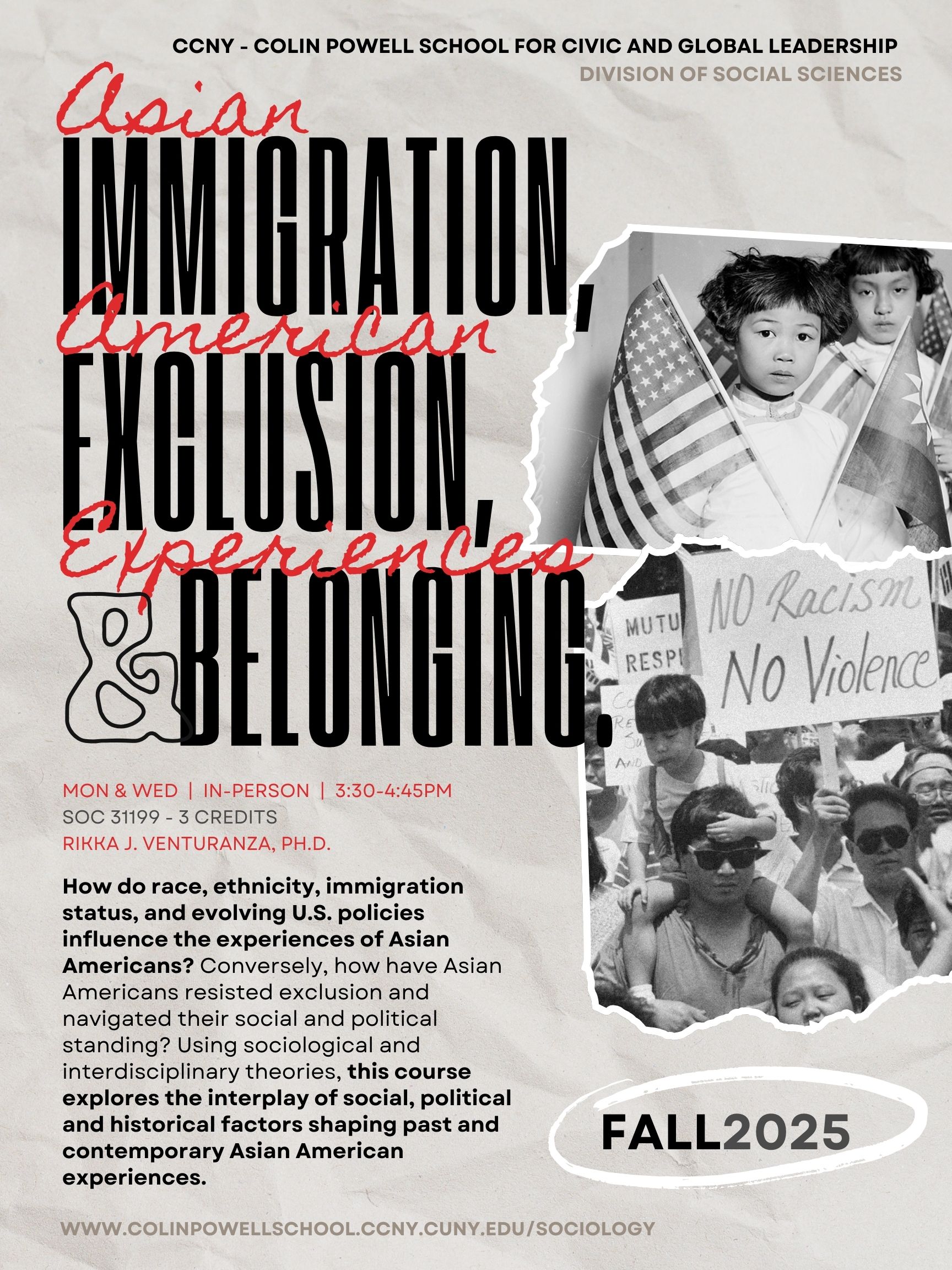
Last Updated: 04/12/2025 22:17